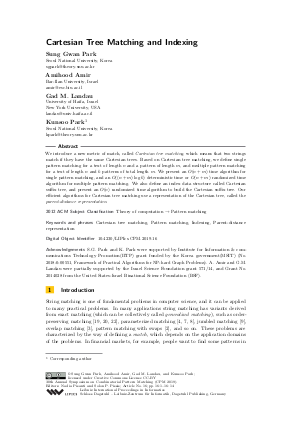@InProceedings{park_et_al:LIPIcs.CPM.2019.16,
author = {Park, Sung Gwan and Amir, Amihood and Landau, Gad M. and Park, Kunsoo},
title = {{Cartesian Tree Matching and Indexing}},
booktitle = {30th Annual Symposium on Combinatorial Pattern Matching (CPM 2019)},
pages = {16:1--16:14},
series = {Leibniz International Proceedings in Informatics (LIPIcs)},
ISBN = {978-3-95977-103-0},
ISSN = {1868-8969},
year = {2019},
volume = {128},
editor = {Pisanti, Nadia and P. Pissis, Solon},
publisher = {Schloss Dagstuhl -- Leibniz-Zentrum f{\"u}r Informatik},
address = {Dagstuhl, Germany},
URL = {https://drops.dagstuhl.de/entities/document/10.4230/LIPIcs.CPM.2019.16},
URN = {urn:nbn:de:0030-drops-104879},
doi = {10.4230/LIPIcs.CPM.2019.16},
annote = {Keywords: Cartesian tree matching, Pattern matching, Indexing, Parent-distance representation}
}

 Creative Commons Attribution 3.0 Unported license
Creative Commons Attribution 3.0 Unported license
